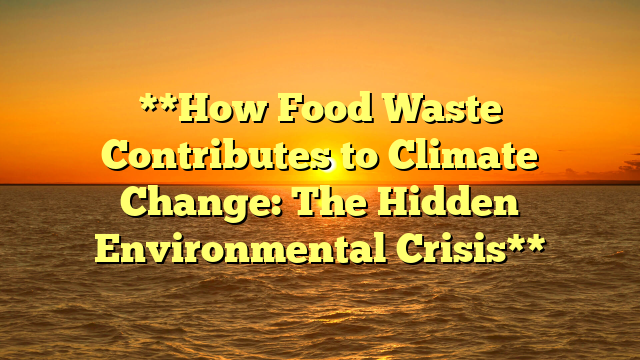Food waste is a global issue that often goes unnoticed, yet it has profound implications for the environment, particularly in the context of climate change. Every year, approximately one-third of all food produced for human consumption—around 1.3 billion tons—is lost or wasted. This staggering amount of waste not only represents a misuse of resources but also significantly contributes to greenhouse gas emissions, exacerbating the climate crisis.
When food is wasted, it doesn’t simply disappear. Instead, it often ends up in landfills, where it decomposes anaerobically (without oxygen). This process produces methane, a potent greenhouse gas that is 28 to 34 times more effective at trapping heat in the atmosphere than carbon dioxide over a 100-year period. According to the United Nations Food and Agriculture Organization (FAO), food waste is responsible for about 8% of global greenhouse gas emissions. If food waste were a country, it would rank as the third-largest emitter of greenhouse gases, behind only China and the United States.
samosir88 of food waste begins long before it reaches landfills. The production of food requires vast amounts of resources, including water, energy, and land. For example, growing crops and raising livestock consume significant quantities of freshwater, and the use of fertilizers and pesticides contributes to soil degradation and water pollution. Additionally, the transportation, processing, and packaging of food all generate carbon emissions. When food is wasted, all these resources and emissions are essentially squandered, further intensifying the environmental footprint.
Moreover, food waste exacerbates deforestation and biodiversity loss. To meet the global demand for food, vast areas of forests are cleared to create agricultural land. This deforestation not only releases stored carbon dioxide into the atmosphere but also destroys habitats for countless species. When food is wasted, the pressure to convert more land for agriculture increases, perpetuating a cycle of environmental degradation.
The social and economic implications of food waste are equally concerning. While millions of tons of food are discarded, nearly 690 million people worldwide suffer from hunger. Reducing food waste could help alleviate food insecurity and ensure that resources are used more efficiently. Economically, food waste represents a significant financial loss for households, businesses, and governments. By addressing food waste, we can save money, reduce environmental harm, and improve food distribution systems.
So, what can be done to tackle this hidden environmental crisis? Individuals, businesses, and governments all have a role to play. At the household level, consumers can reduce food waste by planning meals, storing food properly, and repurposing leftovers. Businesses, particularly those in the food industry, can implement better inventory management, donate surplus food, and adopt sustainable packaging solutions. Governments can support these efforts by implementing policies that encourage food waste reduction, such as tax incentives for donations or stricter regulations on landfill disposal.
Innovative solutions are also emerging to address food waste. For instance, apps that connect consumers with discounted surplus food from restaurants and grocery stores are gaining popularity. Similarly, composting programs can divert food waste from landfills, turning it into nutrient-rich soil instead of methane emissions.
In conclusion, food waste is a critical yet often overlooked contributor to climate change. By understanding its environmental impact and taking collective action to reduce waste, we can mitigate its effects on the planet. Addressing food waste is not just an environmental imperative but also a moral and economic one. It’s time to recognize the hidden crisis of food waste and take meaningful steps toward a more sustainable future.
**How Food Waste Contributes to Climate Change: The Hidden Environmental Crisis**










